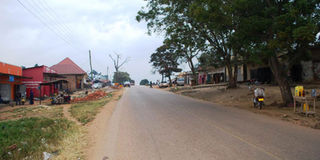Locals demand pay over cancelled oil road works

Affected. A section of the Kyotera-Rakai road that was to be reconstructed. PHOTO BY IVAN KIMBOWA
What you need to know:
- When contacted, Rakai District chairperson Benon Mugabi and his Kyotera counterpart, Mr Patrick Kisekulo, said they are yet to make a joint appeal to government to consider compensating residents who got interrupted by the cancelled project.
- The section of the Ugandan pipeline will cost about $700m (Shs2.4 trillion) and construction is expected to commence in the next financial year.
KYOTERA / RAKAI. Residents whose land and houses were earmarked for compensation in Kyotera and Rakai districts are bitter over the cancellation of the planned expansion of the Kyotera-Rakai road.
The Uganda National Roads Authority (Unra) cancelled the expansion and reconstruction of the 29km road, which had been planned to support the construction of the crude oil pipeline project.
According to Mr Abdul Hakim Kalinaki, the Unra land acquisitions officer, government cancelled the project due to lack of funds.
“The government has fallen short of funds to reconstruct the oil roads as earlier planned. It is not only Kyotera and Rakai districts, which are going to miss out; even Kaseeta - Lwera road in Hoima District will not be expanded as earlier planned, and land owners along those roads are now free to use their plots accordingly,” Mr Kalinaki said in an interview on Sunday.
He said the available funds will be used to compensate people on the already mapped out pipeline route.
According to the government plan, the 1,445km crude oil export pipeline is expected to run from Hoima through 24 sub-counties in the districts of Kakumiro, Kyankwanzi, Mubende, Gomba, Sembabule and Lwengo to Rakai at the border, and then to Tanga port at the Indian Ocean in Tanzania.
Protests
Last week, Mr Kalinaki found a hard time to convince property owners on Kyotera –Rakai road who have in the past one year been waiting for the compensation.
About 900 residents owning land and houses alongside Kyotera-Rakai road complain that they have incurred losses since April last year when their properties were earmarked for demolition.
Ms Prossy Namaganda, who had just bought a piece of land at Kasambya Village outside Kyotera Town to set up a restaurant, says much of her construction materials have gone to waste in process of waiting for compensation to relocate to another area. “I had injected a lot of money in acquiring land along the road and purchasing some of the building materials to start up a restaurant. When Unra unveiled the plan to expand the road, I halted the project and I have all along been waiting for compensation. It really hurts me when they say that no money is going to be given to us,” she says.
Mr Tom Mulindwa, another resident, says many landlords have incurred losses as tenants shunned both residential and commercial buildings for fear of being evicted from the houses to pave way for road expansion.
“Some people had secured bank loans and hoped to pay back when they receive money for compensation; all those people are now stuck,” said Mr Mulindwa, who is also the Kyotera Village chairperson.
According to Mr Amos Mandela, the Rakai District roads committee chairperson, Unra has not officially communicated to them about the cancellation of the road project.
“I am not aware about their change of plan. If it is true, we are going to engage them and ensure that they compensate the affected residents,” he said. The Uganda National Oil Company (UNOC) entrusted Unra with powers to manage the construction of district roads as part of the programme to benefit all districts where the oil pipeline is expected to pass.
Last April, road measurements and valuation processes were done by Unra officials and residents halted all developments in the earmarked areas.
When contacted, Rakai District chairperson Benon Mugabi and his Kyotera counterpart, Mr Patrick Kisekulo, said they are yet to make a joint appeal to government to consider compensating residents who got interrupted by the cancelled project.
The section of the Ugandan pipeline will cost about $700m (Shs2.4 trillion) and construction is expected to commence in the next financial year.
About pipeline
Cost. The section of the Ugandan pipeline will cost about $700m (Shs2.4 trillion) and construction is expected to commence in the next financial year.
Stakeholder meeting. Recently, energy ministers and attorney generals from Uganda and Tanzania met and agreed to further fast-track the construction plans of the pipeline.
Energy minister Irene Muloni and her counterpart, Dr Medard Kalemani from Tanzania, expressed concern that the remaining legal requirements to move the project to the next stage are behind schedule.




